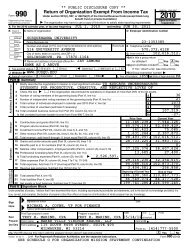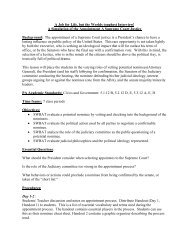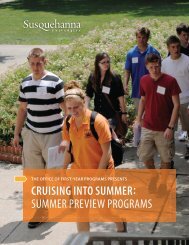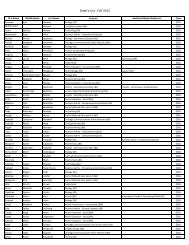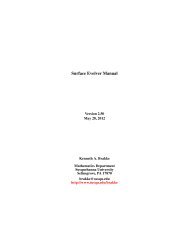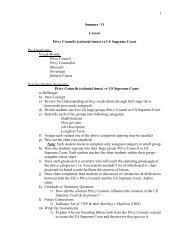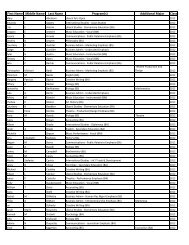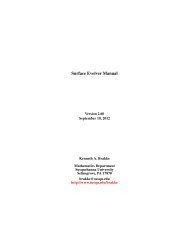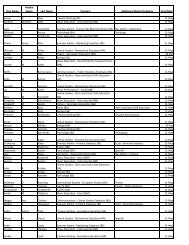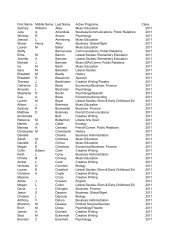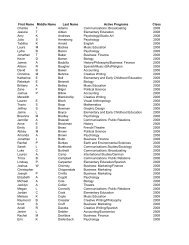Ventures - Susquehanna University
Ventures - Susquehanna University
Ventures - Susquehanna University
You also want an ePaper? Increase the reach of your titles
YUMPU automatically turns print PDFs into web optimized ePapers that Google loves.
SUMMER 2012<br />
Annual Review of the Sigmund Weis School of Business at <strong>Susquehanna</strong> <strong>University</strong><br />
Placing<br />
the World<br />
at Students’<br />
Fingertips<br />
SUMMER 2012<br />
A
dean’s message<br />
On March 25, excitement and pride filled the<br />
room as students and faculty gathered for the 19th<br />
annual Sigmund Weis School of Business Beta<br />
Gamma Sigma induction ceremony. We honored<br />
16 new inductees who rank in the top 7 percent of<br />
their junior class and also recognized 12 university<br />
seniors who were initiated in 2011. Watching our<br />
students get inducted into this prestigious society<br />
is a crowning moment for me each year.<br />
Membership in Beta Gamma Sigma, the<br />
international honor society of collegiate schools<br />
of business and management, is the highest<br />
recognition a student can receive in a program<br />
accredited by AACSB International—The<br />
Association to Advance Collegiate Schools<br />
of Business. And for me, student success is a<br />
testament to the first-rate education we provide.<br />
Moreover, our AACSB accreditation is an<br />
international mark of distinction. As of April,<br />
AACSB had 648 institutions located in 43<br />
countries and territories. The Sigmund Weis<br />
School of Business is one of only 42 member<br />
programs from undergraduate-only institutions.<br />
This internationally respected benchmark<br />
of quality ensures students and parents that<br />
the business school is providing a top-notch<br />
education. It also ensures employers that our<br />
graduates are well prepared for the workplace.<br />
A prime example is John Strangfeld ’75, who<br />
worked his way up to the position of chairman<br />
and CEO of Prudential Financial Inc., as well as<br />
chair of <strong>Susquehanna</strong>’s Board of Trustees. His<br />
success was recognized with induction as an<br />
honorary member of Beta Gamma Sigma. But<br />
during his remarks to new inductees and senior<br />
members, John admitted that the road to success<br />
was not always an easy one. After graduating 81st<br />
in his high school class of 162 pupils, he ended<br />
his first semester at <strong>Susquehanna</strong> with just a<br />
2.3 grade point average (GPA). “I didn’t have a<br />
whole lot of confidence then,” John told his fellow<br />
inductees, “but I looked around and saw that there<br />
were students doing much better than I was.” He<br />
committed to spending every evening Sunday<br />
through Thursday in the library. He stayed until<br />
the library closed and soon found that the extra<br />
hours spent on school work were paying off. (He<br />
ended up with a 4.0 GPA.)<br />
“<strong>Susquehanna</strong> provided a nurturing<br />
environment,” John said, “and I learned that the<br />
extent to which I applied myself affected the<br />
outcome. But at the end of the day, it’s not about<br />
your GPA, it’s about how well you can work with<br />
others; it’s about putting yourself in someone<br />
else’s shoes.”<br />
The business school faculty routinely put<br />
themselves in someone else’s shoes—namely<br />
our students’—to ensure we are providing<br />
them with the best possible education for the<br />
world in which they find themselves. As you’ll<br />
read in this issue, an important initiative for us<br />
has been supporting international study and<br />
international faculty appointments in support of<br />
the university’s new Central Curriculum. This<br />
has resulted in a broad-based student experience<br />
that enriches students both culturally and<br />
academically, and prepares them to compete<br />
in today’s global economy. I hear students and<br />
faculty alike say that class discussions are more<br />
sophisticated, student perspectives more open,<br />
and student interactions more meaningful.<br />
I wish I could bring you all the examples of<br />
this success through <strong>Ventures</strong>. Unfortunately,<br />
like virtually every business in the country, the<br />
university has been faced with budgetary cuts<br />
that affect our ability to continue producing<br />
two issues of this magazine per year. As a<br />
result, we’ve developed this single issue as an<br />
annual report of sorts—a publication, mailed<br />
at the end of the fiscal year, that will highlight<br />
the accomplishments and human interest<br />
stories coming out of the business school. It<br />
will be followed by a dean’s letter in the fall and<br />
enhancements to the business school Web pages,<br />
so be sure to check online for additional stories<br />
in the coming months.<br />
Sincerely,<br />
Alicia J. Jackson<br />
Dean of the Sigmund Weis School of Business
The Sigmund Weis School of Business welcomed 133 new students in<br />
fall 2011. Here's a look at the geographic and academic makeup of<br />
the business school’s freshman class:<br />
state<br />
pennsylvania<br />
new jersey<br />
new york<br />
PA - 59 NJ - 39 NY - 9<br />
Pennsylvania: 59<br />
New Jersey: 39<br />
New York: 9<br />
by the<br />
numbers<br />
progrAM<br />
Accounting: 19<br />
Business Economics: 2<br />
Entrepreneurship: 5<br />
maryland<br />
MD 7<br />
connecticut<br />
CT - 6<br />
maine<br />
ME - 3<br />
Finance: 10<br />
Global Markets: 6<br />
Maryland: 7<br />
Connecticut: 6<br />
Maine: 3<br />
Human Resources: 1<br />
NH - 2<br />
new hampshire<br />
NC - 1<br />
north carolina<br />
virginia<br />
VA - 1<br />
Marketing: 17<br />
Information Systems: 2<br />
New Hampshire: 2<br />
North Carolina: 1<br />
Virginia: 1<br />
Business Undecided: 71<br />
country<br />
2 2<br />
1 1<br />
Canada: 2 China: 2 Myanmar: 1 Vietnam: 1
partners &<br />
planners<br />
The following people are members of<br />
the Sigmund Weis School of Business Advisory Council<br />
Anne Eddinger ’02<br />
Bill Quinn ’91<br />
Bob Hadfield ’68<br />
David Bussard<br />
Associate Professor<br />
of Management<br />
Greg Carr ’83<br />
James App ’65<br />
Jameson Troutman ’02<br />
Jan Lessman ’76<br />
Joe Shannon ’08<br />
Carl Moses<br />
Provost and Dean of Faculty<br />
Neil Crowell ’02<br />
Nicole Payne ’99<br />
Richard Orwig<br />
Associate Professor of<br />
Information Systems<br />
Rob Leslie ’80<br />
Matthew Rousu<br />
Associate Professor<br />
of Economics<br />
Sidney Apfelbaum, H’09<br />
<strong>Susquehanna</strong> <strong>University</strong> Trustee<br />
The following students make up<br />
the Dean’s Student Advisory Council<br />
Joshua Allen ’13<br />
Accounting<br />
Robin Carey ’12<br />
Business Administration–Finance<br />
Economics–Financial Economics<br />
Stephanie Chan ’13<br />
Business Administration–Finance<br />
Kristen Dumbeck ’13<br />
Business Administration–Finance<br />
and Global Management<br />
Sarah Easton ’13<br />
Business Administration–Marketing<br />
Jesse Eggerton ’12<br />
Business Administration–Finance<br />
Teague Emery ’13<br />
Business Administration–<br />
Entrepreneurship and Finance<br />
Jonathan Fellin ’12<br />
Economics<br />
Michelle Kraske ’13<br />
Business Administration–Marketing<br />
Yohannes Mengsteab ’13<br />
Business Administration–Finance<br />
Economics–Financial Economics<br />
Taylor Morrow ’13<br />
Accounting<br />
Brett Moyer ’13<br />
Business Administration–Finance and Marketing<br />
Caelan Perez ’15<br />
Economics<br />
Katelyn Reese ’12<br />
Accounting
SUMMER2012<br />
Annual Review of the Sigmund Weis School of Business at <strong>Susquehanna</strong> <strong>University</strong><br />
Dean of the Sigmund Weis<br />
School of Business<br />
Alicia J. Jackson<br />
Chief Communications<br />
Officer<br />
Angela Burrows<br />
Editor<br />
Victoria Kidd<br />
Assistant Director,<br />
Advancement Communications<br />
Contributing Writers<br />
Bruce E. Beans<br />
Megan McDermott ’14<br />
Dalton Swett ’13<br />
Graphic Design<br />
Amanda Lenig ’07<br />
Creative Services Manager<br />
Steve Semanchik ’08<br />
Graphic Designer<br />
Copy Editors<br />
Kathleen Larson Florio<br />
Betsy K. Robertson<br />
Interim Director, Publications<br />
and Media Relations<br />
Sigmund Weis<br />
School of Business<br />
<strong>Susquehanna</strong> <strong>University</strong><br />
514 <strong>University</strong> Ave.<br />
Selinsgrove, PA 17870<br />
570.372.4455<br />
www.susqu.edu/business<br />
2<br />
8<br />
10<br />
12<br />
14<br />
top story<br />
Placing the World at Students’ Fingertips<br />
high flyers<br />
Former H&R Block CEO Encourages Openness and Versatility<br />
Coursework + Campus Involvement = Career Success<br />
faculty spotlight<br />
Tracy Rishel: New Professor Plays Ball With Betting Research<br />
campus news<br />
Young Entrepreneurs Thrive at <strong>Susquehanna</strong><br />
<strong>Susquehanna</strong> SIFE Continues Reign<br />
New Club Supports Students’ Entrepreneurial Spirit<br />
Students, Alumnus Inducted Into Honor Society<br />
faculty spotlight<br />
Amresh Kumar: Marketing Self and Service in the Age of Social Media<br />
On the cover<br />
Associate Professor of Finance Pat Polwitoon, a native of Bangkok,<br />
is one of the international faculty members bringing global<br />
perspectives to the classroom. He and Barbara McElroy, associate<br />
professor of accounting and chair of the Department of Accounting<br />
and Information Systems, have developed a forthcoming GO Short<br />
program to Thailand. See article, p. 2.<br />
SUMMER 2012 1
I N T E R N A T I O N A L<br />
B U S I N E S S<br />
Placing the World<br />
at<br />
Students’ Fingertips<br />
By Bruce E. Beans<br />
I N T E R N AT I O N A L<br />
B U S I N E S S<br />
M A R K E T I N G<br />
QUANTITATIVE<br />
METHODS<br />
FOR<br />
BUSINESS<br />
FINANCIAL<br />
ACCOUNTING<br />
LONDON<br />
AUS<br />
OPERATIONS<br />
MANAGEMENT<br />
COSTA RICA<br />
NOLA<br />
PARIS<br />
G L O B A L<br />
MANAGEMENT<br />
DUBLIN<br />
ROMA<br />
TOPICS IN<br />
FINAN CE<br />
MARKETING
top story<br />
After just one semester on campus, Kristin Dumbeck decided it was time to take advantage of<br />
<strong>Susquehanna</strong> <strong>University</strong>’s student exchange program with the <strong>University</strong> of Macau near Hong Kong.<br />
Living with a mainland Chinese student, the Pittsburgh resident played the flute in the university’s<br />
symphonic orchestra, tutored a fifth-grade South Korean girl in English, and bought groceries on the<br />
mainland. Traveling into the interior with a Chinese friend, she kayaked down a river past grazing<br />
yaks and stayed in a village where many homes had no electricity.<br />
“I felt like I was on a different planet,” says the now-rising senior who is studying economics,<br />
finance and global management. “From the way I looked to the jeans I wore, how I ate and how<br />
I talked, I was different. On the mainland, people would just stare at me.”<br />
But unlike some other Western students she encountered, who assumed the Chinese were<br />
too shy or not fun-loving, Dumbeck took the time to understand her Chinese classmates’<br />
traditions. “Once you accepted them within the context of their culture, you could begin<br />
to get to know them as individuals,” Dumbeck says.<br />
Dumbeck also spent last fall living with a French-speaking family while attending the Université<br />
Libre de Bruxelles in Brussels, Belgium. As a result of studying in both Europe and China, she says,<br />
“I feel like my frame of reference is totally different and really broadened.” For example, now when her<br />
classmates offer U.S. business examples, she’s thinking of Macau versus Hong Kong. “From<br />
management styles to world affairs,” says Dumbeck, who hopes to work on Wall Street,<br />
“I don’t just think in the context of the United States anymore.”<br />
The GO program now makes you think more about<br />
where you want to go rather than if you want to go.<br />
—Katarina Keller, Associate Professor of Economics<br />
The Sigmund Weis School of Business is encouraging its students to follow<br />
Dumbeck’s example by thinking globally—and going global—more than ever<br />
before. That emphasis is the result of both the school’s current strategic plan and<br />
a university-wide curriculum mandate that, beginning with the Class of 2013,<br />
requires every student to have completed and reflected upon at least one significant<br />
cross-cultural experience before graduation.<br />
“In the words of New York Times columnist Thomas Friedman, the world<br />
is becoming flat,” explains Alicia J. Jackson, dean of the Sigmund Weis<br />
School of Business. “Our students are going to be engaging with individuals<br />
SUMMER 2012 3
SIGMUND WEIS SCHOOL OF BUSINESS STUDY ABROAD Locations<br />
Figures indicate the number of students who participated in the study-away program in each location.<br />
ENGLAND – 55<br />
- London : GO Long<br />
GO Short<br />
SU CASA – 1<br />
- Costa Rica : GO Short<br />
- Nicaragua : GO Short<br />
CANADA – 1<br />
- GO Your Own Way<br />
ITALY – 14<br />
- Rome : GO Long<br />
- Perugia : GO Long<br />
- GO Your Own Way<br />
- GO Short<br />
IRELAND – 2<br />
- Dublin : GO Long<br />
- GO Short<br />
SCOTLAND – 1<br />
- Stirling : GO Long<br />
AUSTRALIA – 2<br />
- Cairns : GO Long<br />
- Townsville : GO Long<br />
NEW ZEALAND – 3<br />
- Otago : GO Long<br />
- GO Short<br />
FRANCE – 1<br />
- Paris : GO Long<br />
HRT – 3<br />
- New Orleans : GO Short<br />
BELGIUM – 1<br />
- Brussels : GO Long<br />
The Stein fellows from summer 2011 were: Kelli Nebiker – Czech Republic : : Matt Quadrini – Czech Republic<br />
Peter Jones – Spain : : Rachel DiMattia – Italy : : Katelyn Reese – Ireland : : Michael Kelso – Australia<br />
from multiple cultures throughout their business<br />
lives. They will either be traveling and working<br />
internationally or dealing in the United States<br />
with internationals from all over the world—<br />
either because they live here or have come here<br />
to conduct business.<br />
“For our students to grow as both individuals and<br />
future business leaders, it is important for them to<br />
become more culturally sensitive.”<br />
Factors helping to create such an environment include<br />
International faculty: As a result of active recruitment<br />
efforts, 43 percent of the business school’s full-time<br />
faculty is foreign-born.<br />
GO (Global Opportunities) Long: More than 50<br />
semester-long opportunities, including the business<br />
school’s London Program, are available.<br />
GO Short: A rotating lineup of 18 two- to threeweek<br />
programs, held over winter and summer<br />
breaks, offers students cross-cultural experiences<br />
on six continents.<br />
Mandatory freshman Global Business Perspectives course:<br />
The course thrusts students into the global<br />
business world by dividing them into competitive<br />
teams that conduct business case studies of a<br />
publicly traded company.<br />
Foreign-exchange students: This past spring, three<br />
of <strong>Susquehanna</strong>’s foreign-exchange students took<br />
business classes, bringing both Chinese and Russian<br />
perspectives to the classroom.<br />
Since launching the London Program in 1995 (the<br />
largest and longest-running <strong>Susquehanna</strong>-sponsored<br />
study-abroad program), the business school has been
Katarina Keller, associate professor of economics and<br />
a native of Sweden who has also studied in Germany,<br />
Russia and France, says students returning from studyaway<br />
experiences often demonstrate more interest in<br />
world affairs than they did prior to their trips.<br />
an institutional leader in exposing its students to the<br />
broader world. About 20–25 juniors each semester<br />
combine extensive study of the European economy<br />
and culture with sponsored and self-initiated trips<br />
throughout the continent.<br />
The newer GO Short programs have opened up<br />
another world of possibilities. Taught by <strong>Susquehanna</strong><br />
faculty and staff, GO Short includes a preparatory<br />
class, an intense two- to three-week cross-cultural<br />
experience and a two-credit reflective seminar the<br />
following semester. Business school professors have<br />
led GO Short programs to Peru, Great Britain and<br />
northern Italy. They also are planning programs<br />
in Thailand and Botswana. This June, Professor of<br />
Accounting Rick Davis will co-direct British Law<br />
and Culture, a GO Short program he developed and<br />
led to London for the first time last year.<br />
“It opens students’ eyes to the realization that<br />
the rest of this planet is not just like Selinsgrove or<br />
Pennsylvania or even the United States,” says Davis.<br />
“Just because in our culture we do things a particular<br />
way does not mean it is necessarily the only way or<br />
even the right way”—a sensibility that, he notes, in<br />
the business world can make the difference between<br />
coming home empty-handed or with millions of<br />
dollars’ worth of business.<br />
For athletes such as basketball player Scott<br />
Marcinek ’13, the son of <strong>Susquehanna</strong> basketball<br />
coach Frank Marcinek, the GO Short format of<br />
Davis’ program was ideal. It allowed him to have<br />
a study-away experience while continuing his<br />
commitment to the basketball team.<br />
Short programs also work for students either<br />
unsure about or unable to make a semester-long<br />
commitment. “Even though it was just a short time,<br />
being thrown into the everyday life of London has<br />
changed me,” says Michael Svrcek, now a rising senior<br />
finance major from Pottsville, Pa. “Now I want to<br />
travel more and I’m open to many more job options.”<br />
Or consider Morgan Klinger, a rising junior from<br />
rural Elizabethville, Pa. She had never used public<br />
transportation before boarding a London tube train.<br />
“It was definitely culture shock, but once I got used to<br />
it, I fell in love with the city,” says Klinger, who is now<br />
returning for the full-semester London Program.<br />
Students also benefit from the extensive<br />
international experience of faculty members—<br />
both those who are foreign-born or educated and<br />
American-born professors active overseas. For<br />
example, Canadian-born Paul S. Dion, associate<br />
professor of management, co-developed a doctorate<br />
program in management studies for the <strong>University</strong><br />
of the West Indies in St. Augustine, Trinidad. He<br />
also recruited Barbara McElroy, associate professor<br />
of accounting and chair of the Department of<br />
The first group of students to experience British Law<br />
and Culture, a GO Short program developed by Professor<br />
of Accounting Rick Davis<br />
SUMMER 2012 5
Professor of Accounting<br />
Rick Davis (right) and<br />
Tom Rambo, assistant<br />
vice president for<br />
student life and director<br />
of public safety,<br />
co-directed the first<br />
British Law and Culture<br />
program last year.<br />
Accounting and Information Systems, to teach the<br />
doctoral candidates a qualitative research seminar.<br />
She has since developed a forthcoming GO<br />
Short program in Thailand with Bangkok native<br />
Pat Polwitoon, associate professor of finance.<br />
“What I’m noticing more now among a lot of<br />
<strong>Susquehanna</strong> students is a willingness and an<br />
excitement, rather than a reluctance, to explore<br />
other cultures,” McElroy says.<br />
Incorporating student service and business issues,<br />
the Thailand program will focus on sustainability<br />
questions by having students follow a watershed<br />
from its mountain headwaters—a now-thriving<br />
agricultural area once wracked by poppy and<br />
cocaine production—to a coastal resort. Says<br />
Polwitoon, who began his career with an<br />
investment bank in Bangkok: “I hope our students<br />
come to realize that you can be happy without so<br />
much material goods.”<br />
Meanwhile, Zui Chih Lee, assistant professor<br />
of marketing and a native of Taiwan, first came<br />
to America to sell Taiwan-made lighters to<br />
Wal-Mart. “I help our students bridge their<br />
perceptions from western to eastern business<br />
cultures,” he says. For example, he offers students<br />
It opens students’ eyes to the<br />
realization that the rest of this planet<br />
is not just like Selinsgrove or Pennsylvania<br />
or even the United States.<br />
—RICK DAVis, Professor of Accounting<br />
Mengsteab Tesfayohannes-Beraki, associate professor<br />
of management, brings more than 20 years of<br />
international work experience to the classroom. He<br />
has been a professor, researcher, and business and<br />
economic development consultant at academic<br />
insights into how Costco successfully downsized<br />
its buildings to better meet the tastes of Taiwanese<br />
consumers. Yet another unique perspective is<br />
provided by Katarina Keller, associate professor<br />
of economics, a native of Sweden who has also<br />
studied in Germany, Russia and France.<br />
“You can see a big difference between those<br />
who have gone abroad and those who haven’t,”<br />
says Keller, who teaches an international political<br />
economy class. “They relate in a different way to<br />
what’s going on internationally, and they’re more<br />
interested in world affairs—both in where they’ve<br />
been and in parts of the world they haven’t visited.<br />
They contribute such intelligent comments about<br />
world events, and their anecdotes are often more<br />
memorable than just reading a textbook.”<br />
Their experiences also inspire other students<br />
to go abroad. “The GO program,” she adds, “now<br />
makes you think more about where you want to<br />
go rather than if you want to go.”<br />
Two years ago, Bobby Ries, then a rising<br />
sophomore, accompanied Associate Professor<br />
of Management David T. Bussard and Alicia<br />
Jackson on a GO Short program to Peru, where<br />
they built and installed clean-burning brick<br />
cooking stoves and chimneys in one-room huts<br />
high in the Andes. Working as a team, Ries and
institutions, and governmental and<br />
private organizations in countries<br />
including the United States, Canada,<br />
South Africa, Botswana, Germany,<br />
Austria, Eritrea and Ethiopia.<br />
his partner, Chris Zimmerman ’13, installed more than 20 stoves<br />
to rid homes of smoke—a common breathing hazard for the people<br />
of this region.<br />
“Installing stoves involves planning, organizing, directing,<br />
division of labor, inventories and preparation of materials,” says<br />
Bussard, director of the business school’s international programs.<br />
“So, although we didn’t teach it that way, a lot of business functions<br />
were involved. And Bobby exhibited outstanding leadership skills in<br />
working with and speaking with the people.”<br />
“At first it’s nerve-wracking because they don’t know any English and<br />
you’re in a different country,” says Ries, a finance and Spanish major<br />
who lived with a Peruvian family during the trip. “But after a while you<br />
begin to develop a relationship with them; you become comfortable<br />
speaking, and that’s when your conversational skills pick up.”<br />
The Cherry Hill, N.J., resident improved his Spanish even more last<br />
fall living with a Spanish family while he bravely took accounting<br />
and bank and stock market management courses—in Spanish—at the<br />
Universidad de Alicante on Spain’s Costa Blanca.<br />
Now, he says, “In my business classes at <strong>Susquehanna</strong> we’re<br />
pointing fingers across the ocean saying Europe’s the cause of the<br />
economic crisis. But in my classes in Spain the professors were<br />
pointing at me and saying my country is the source of the problem.<br />
“That different perspective is valuable,” says Ries, who hopes to<br />
become an analyst focusing on Latin America for a capital firm.<br />
“I really think I grew up a lot over there,” adds the rising senior.<br />
“You just get a broader understanding of how the world works when<br />
you’re forced out of your comfort zone, and you also really get to find<br />
out more about yourself.”<br />
Bruce E. Beans is a freelance writer from Warrington, Pa.<br />
(Above) Alicia J. Jackson, dean of<br />
the business school, teams up with a<br />
student for painting duty during this<br />
year's SU CASA, <strong>Susquehanna</strong>'s longrunning<br />
service-learning trip to Costa<br />
Rica and Nicaragua.<br />
International FACulty at a Glance<br />
The following professors in the Sigmund<br />
Weis School of Business were born abroad:<br />
DEPARTMENT of management<br />
Ali Haji-Mohamad Zadeh, Ph.D.<br />
professor of finance and department chair<br />
Iran<br />
Paul S. Dion, Ph.D.<br />
associate professor of management<br />
Canada<br />
Pat Polwitoon, Ph.D.<br />
associate professor of finance<br />
Thailand<br />
Mengsteab Tesfayohannes-Beraki, Ph.D.<br />
associate professor of management<br />
Eritrea<br />
Amresh Kumar, Ph.D.<br />
assistant professor of marketing<br />
India<br />
Zui Chih Lee, Ph.D.<br />
assistant professor of marketing<br />
Taiwan<br />
department of economics<br />
Olu Onafowora, Ph.D.<br />
professor of economics and<br />
department chair<br />
Nigeria<br />
Katarina R. Keller, Ph.D.<br />
associate professor of economics<br />
Sweden<br />
Antonin Rusek, Ph.D.<br />
associate professor of economics<br />
Czech Republic<br />
SUMMER 2012 7
high flyers<br />
Former H&R Block CEO Encourages Openness and Versatility<br />
By Megan Mc DermoTT ’14<br />
When Alan Bennett ’72 says, “Don’t predestine your future. Be open to experiences,” students are inclined<br />
to listen. He followed his own advice and has tremendous success to show for it, including runs as interim<br />
CEO of H&R Block from 2007 to 2008 and president and CEO from 2010 to 2011.<br />
Bennett says preparation for those leadership roles “came from a balance of experiences” in finance,<br />
marketing and sales, as well as experience running a small business early in his career.<br />
As an accounting major, Bennett aspired for a career in finance culminating in a CFO position. He<br />
took an accounting position with Ernst & Whinney after graduation, but he soon deviated from the<br />
typical accountant’s trajectory. In addition to finance positions with the insurance giant Aetna, Bennett<br />
accumulated experience in running a small business and was head of sales and marketing for Pirelli<br />
Armstrong Tire Corp. for 10 years.<br />
During Bennett’s time on campus as Sigmund Weis lecturer and executive-in-residence, students benefited<br />
from that varied experience through his lecture, A View From the Boardroom, and classroom visits.<br />
Bennett’s lecture conveyed the importance of vision and strategic decision making. “Everything<br />
stems from having a vision of what the company might be or could be in the future,” he said. “That<br />
directs all other activities.”<br />
In the classroom, Bennett delivered presentations. For a Legal Environment and Management course,<br />
he emphasized the board’s ethical responsibilities and role in fostering a company’s reputation. “The most<br />
important thing is having the right tone at the top of the company,” Bennett says. Top executives should<br />
be, “living in the culture they want the company to emulate.”<br />
He also fielded questions on excelling in the job market. “Companies are looking for differentiation,<br />
and the more you can do to separate yourself in positive ways, the better chance you have at achieving<br />
earlier success or more success,” Bennett says.<br />
He advised students to aggressively pursue experiences. “Effort counts. I think if you make 10 sales<br />
calls, you make one sale. If you make 20, you’ll sell two,” says Bennett, who applies that principle to career<br />
management. “Always be thinking about how you can make [your area] more efficient. How do you add<br />
value to the process in that area?”<br />
Bennett described the business students he interacted with as “smart, inquisitive and purposeful,” just<br />
as his classmates were during his time at <strong>Susquehanna</strong>.<br />
As a student, Bennett snagged an internship with a top accounting firm. He praises <strong>Susquehanna</strong> for<br />
delivering internship opportunities many other schools couldn’t. His education also helped him take<br />
advantage of opportunities that came during and after his time as a student.<br />
“My <strong>Susquehanna</strong> education opened my eyes to be open to learning,” Bennett explains. “When I got in<br />
the real work force, I did learn.”<br />
As an alumnus, he supports the school as a member of the <strong>Susquehanna</strong> <strong>University</strong> Board of Trustees.<br />
He believes that alumni involvement sends an important message to students: “The education that<br />
<strong>Susquehanna</strong> provides is at par or beyond other schools, and you can compete for prestigious jobs in any<br />
marketplace.” Bennett reminds students, “This is an education that should be valued.”
Coursework + CAMPUS Involvement = cAreer Success<br />
By Megan Mc DermoTT ’14<br />
Anne Penman ’02 Eddinger, who works as associate<br />
brand manager of Women’s Systems at Energizer<br />
Personal Care in Shelton, Conn., holds a master’s<br />
degree in business administration from the <strong>University</strong><br />
of Virginia and previously worked at Prudential, where<br />
she held such titles as chief of staff for annuity sales and<br />
senior analyst for annuity compliance. This impressive<br />
string of accomplishments stretches back to her time<br />
at <strong>Susquehanna</strong>, where she accumulated foundational<br />
experiences in business and leadership both inside and<br />
outside the classroom.<br />
Involvement in Sigma Kappa made “a big impact on my own<br />
personal growth and development,” Eddinger says. “As vice<br />
president of the sorority, I learned a lot about the challenges of<br />
leading a group and balancing work and friendship.” Working<br />
as finance manager at Charlie’s Coffeehouse during her junior<br />
and senior years allowed her to apply classroom knowledge to<br />
running a small business, and a semester abroad with the business<br />
school’s London Program broadened her perspective even more.<br />
Meanwhile, business courses were contributing business fundamentals<br />
and a solid foundation in problem solving and analytical skills. Eddinger<br />
says, “Through my coursework and the London Program, along with my<br />
liberal arts education, I felt confident entering the workforce that I had the<br />
skills … to be successful in whatever I did next.”<br />
Her career success shows her confidence was well-placed. In Eddinger’s<br />
world of consumer-products brand management, “no day is ever quite the<br />
same,” but she consistently uses her skills in leadership, collaboration and<br />
project management to strengthen the Women’s Systems brand. Day-today<br />
work might include coordinating with internal partners and external<br />
agencies, managing the team’s budget, consumer sampling and social<br />
media strategy, among other responsibilities.<br />
She has just as much on her plate outside the office. Eddinger and her<br />
husband, Luke Eddinger ’00, have a 2-year-old daughter, Evelyn, and<br />
are expecting another child in August. The couple was paired together for<br />
a business mentorship program after Luke graduated, and they worked<br />
together at Prudential before they began dating.<br />
“Balancing career and a family life is definitely a juggling act, as both<br />
need lots of love and attention,” Eddinger says. “Finding an organization whose<br />
culture supports the work-family balance has been key to my own happiness.”<br />
Despite her full schedule, Eddinger supports the business school in its<br />
mission and advises the dean as a member of the Sigmund Weis School<br />
of Business Advisory Council. She says she does so in appreciation of the<br />
experiences she had there—experiences that were clearly fulfilling both<br />
personally and professionally.<br />
Anne Penman ’02 Eddinger and husband Luke ’00<br />
Vice President—Sigma Kappa<br />
Finance Manager—<br />
Charlie's Coffeehouse<br />
lOndon Program<br />
Business Coursework<br />
Liberal Arts Education<br />
MASter’s degree in<br />
business administration—<br />
<strong>University</strong> of Virginia<br />
chief of staff for<br />
annuity sales—Prudential<br />
senior analyst for annuity<br />
compliance—Prudential<br />
associate brand manager—<br />
Women’s Systems at Energizer<br />
Personal Care<br />
SWSB Advisory Council<br />
WIFE—to Luke Eddinger ’00<br />
Mother—of Evelyn (2) and<br />
expecting in August<br />
college postgraduate current<br />
SUMMER 2012 9
faculty<br />
spotlight
New Professor Plays Ball<br />
with Betting Research<br />
By Dalton Swett ’13<br />
New Associate Professor of Management Tracy Rishel confesses to being a bit of<br />
a sports fanatic, and surely that’s influenced her decision to undertake research<br />
on betting with C. Barry Pfitzner and Steven Lang, economics professors at<br />
Randolph-Macon College. The trio conducted a study questioning the over/under<br />
betting line that people use when laying down their cash on sporting events.<br />
“The sports betting literature is replete with naïve betting rules,” says Rishel.<br />
“Bet the ‘home’ underdog; bet the team that has failed to cover the spread the last<br />
two times; stuff like that.” Rishel and her colleagues wanted to find a method that<br />
focused on how the teams match up against each other through computational<br />
predictions rather than personal feelings.<br />
Betting lines are set by a bookmaker who determines a possible score for a<br />
game. People may then bet whether the game will have fewer points or more<br />
points scored based on what the bookmaker puts up. This system is problematic<br />
because bookmakers are influenced by the previous week’s scores.<br />
Rishel analyzed the results of more than 190 NFL games leading up to the<br />
2010–11 season. Incorporating several variables including turnovers and total<br />
yards, Rishel found that recent information played little part in the scoring of<br />
games. Instead Rishel points to defensive versus offensive statistics and offensive<br />
yards gained as key factors in determining outcomes of games. Rishel advises<br />
ignoring the previous week’s scores, saying, “If Team A scores lots of points in last<br />
week’s game, they are equally likely to score as many or fewer in this week’s game.<br />
The line, however, seems to reflect the assumption that teams are streaky.”<br />
The difficulties found in collecting, organizing and formatting data for such<br />
research is covered in Rishel’s classes. She informs her students of the difficulties<br />
in research and what they should take into consideration when researching their<br />
projects. She also talks about presenting the information in an understandable<br />
way for the intended audience.<br />
Rishel’s research, titled The Determinants of Scoring in 2010 NFL Games and<br />
the Over/Under Line, was featured by Reuters news agency and Men’s Health<br />
magazine. It doesn’t make the scores of games predictable, but it makes bettors<br />
feel more confident in their bets. As Rishel says, “The outcomes and points<br />
scored are not easily predicted, which is why they play the games.”<br />
TrACY Rishel<br />
Associate Professor of Management<br />
It doesn’t<br />
make the<br />
scores of games<br />
predictable,<br />
but it makes<br />
bettors feel<br />
more confident<br />
in their bets.<br />
The outcomes<br />
and points<br />
scored are<br />
not easily<br />
predicted,<br />
which is<br />
why they play<br />
the games.<br />
SUMMER 2012 11
campus news<br />
Lauren Elsasser ’13<br />
Josh Rogers ’12<br />
Web Extra<br />
Check out Let’s Make<br />
Whoopie’s Facebook<br />
page (facebook.com/<br />
letsmakewhoopie).<br />
More information is<br />
also available on Lauren<br />
Elsasser’s website<br />
for her preexisting<br />
cupcake business,<br />
The Miss Cupcake<br />
(themisscupcake.com).<br />
Young Entrepreneurs Thrive at <strong>Susquehanna</strong><br />
By Megan Mc DermoTT ’14<br />
Students emerge from New Venture Start-up and Financing, a course taught by Associate Professor of<br />
Management Mengsteab Tesfayohannes, with sharpened entrepreneurial skills. Some also leave with<br />
blossoming businesses.<br />
The class, which is required for an entrepreneurship emphasis, teaches students about the challenges and<br />
opportunities in starting up business ventures. Students gain hands-on experience with creating business<br />
plans and securing finances as they start up a “mini-venture,” fueled by $100 in initial capital.<br />
Lauren Elsasser ’13 and Josh Rogers ’12 have every intention of continuing their venture. The business<br />
administration–entrepreneurship majors are partners in a whoopie pie business called Let’s Make Whoopie.<br />
Though they only had to design a “mini-venture” for class, Elsasser says, “We wanted to take the opportunity<br />
to start something big.”<br />
Let’s Make Whoopie sells gourmet whoopie pies and offers customized whoopie pie bars for special<br />
events. The company also sells apparel, including aprons, sweatshirts, underwear and t-shirts, which will<br />
soon be available online.<br />
The pair took the top $5,000 prize in the Greater <strong>Susquehanna</strong> Keystone Innovation Zone’s 2012<br />
Venture Plan Competition this spring. They competed against teams from <strong>Susquehanna</strong>, Bloomsburg<br />
<strong>University</strong>, Bucknell <strong>University</strong> and Luzerne County Community College. “Now we have seed money<br />
to launch our business into success,” says Elsasser. They plan to base Let’s Make Whoopie in Lewisburg,<br />
Pa., and expand into Harrisburg, New York City and Washington, D.C.<br />
Other students from Tesfayohannes’ class have also received recognition for their strong entrepreneurial<br />
skills. In March, four New Venture Start-up students, Elsasser, Brittany Trinidad ’12, Russian exchange<br />
student Kirill Tumanov and Emmanuel Tapia ’12, represented <strong>Susquehanna</strong> at the Southeast<br />
Entrepreneurship Conference at the <strong>University</strong> of Tampa. The conference featured an elevator pitch<br />
competition in which students have the amount of time it takes to ride an elevator to present their business<br />
idea to a panel of judges composed of venture capitalists, entrepreneurs and other business professionals.<br />
Tapia became a finalist, ranking in the top six out of 65 other students from around the country.<br />
He pitched Simply Unique Inc., a five-week, after-school program designed to foster entrepreneurship<br />
skills in children.<br />
“I’ve never done an elevator pitch before so I didn’t know what to expect,” Tapia said. “It was<br />
a pleasure and a unique learning experience.”<br />
Tesfayohannes says that learning how to present effective elevator pitches is important because it gives<br />
students a chance to “introduce their business opportunity to a wider audience” and attract supporters and<br />
partners. With its experiential approach, New Venture Start-up and Financing cultivates the skills students<br />
need to begin developing their own businesses.<br />
<strong>Susquehanna</strong> SIFE Continues Reign<br />
The <strong>Susquehanna</strong> <strong>University</strong> Students in Free Enterprise (SIFE) team was named a league champion for<br />
the ninth consecutive year at the Baltimore SIFE USA Regional Competition. The event was one of 11 such<br />
competitions held across the country in March and April.<br />
SIFE members use business concepts to develop community outreach projects that improve the<br />
quality of life and standard of living for people in need. Regional competitions identify which teams<br />
had the greatest impact on their communities. Participating teams distribute an annual report and make
a live presentation to a group of executives serving as judges. <strong>Susquehanna</strong>’s student presenters at this year’s<br />
event included seniors Robin Carey, of Sherman, Conn.; William Davis, of Hilliard, Ohio; Jose D’Oleo, of<br />
New York City; Andrew Torok, of Voorhees, N.J.; and juniors Brett Moyer, of Watsontown, Pa., and Kees<br />
Van Haasteren, of Raymond, Maine. Senior Sarah Andrews, of Perkasie, Pa., developed the 24-minute<br />
video that accompanied the presentation. In addition to participating in this year’s competition, the students<br />
had the opportunity to interview for jobs and internships at the event’s career fair.<br />
Although <strong>Susquehanna</strong>’s SIFE team is sponsored by the Sigmund Weis School of Business, members<br />
represent 12 different majors at the university. <strong>Susquehanna</strong>’s SIFE is one of nearly 600 programs in the<br />
United States. During the 2011–12 academic year, the <strong>Susquehanna</strong> team spent more than 2,000 hours<br />
designing and implementing 21 projects that have directly affected more than 23,000 people in the<br />
community. Projects included providing personal success materials to inmates at an area correctional<br />
institution, assisting the local community and its businesses, and helping the founder of a local animalassisted<br />
therapy organization.<br />
New Club Supports Students’ Entrepreneurial Spirit<br />
Since fall 2011, the Entrepreneurship Club has<br />
been bringing a new kind of collaborative work<br />
to campus. Co-founded by rising seniors Lauren<br />
Elsasser and Ryan Kennedy, the club aims to<br />
encourage various majors to come together and<br />
foster entrepreneurial growth.<br />
“We want people who have an idea to come<br />
to us so that we can collaborate together with<br />
them,” Elsasser says. “Maybe they don’t have the<br />
skills necessary to accomplish what they want, or<br />
maybe they just need a little encouragement and<br />
support.” Whatever the case may be, Elsasser says,<br />
students now have a home in which to realize<br />
their entrepreneurial dreams.<br />
Inspired by an entrepreneurial conference<br />
attended by members in Tampa, the club plans to<br />
host its own entrepreneurial conference next spring.<br />
The conference will give club members the chance<br />
to share their ideas with like-minded individuals.<br />
The Entrepreneurship Club is also working on<br />
an affiliation with the Collegiate Entrepreneurs’<br />
Organization (CEO), an entrepreneurship network<br />
with chapters on more than 240 university campuses<br />
across North America.<br />
Students, Alumnus Inducted Into Honor Society<br />
<strong>Susquehanna</strong> <strong>University</strong>’s Sigmund Weis School of Business celebrated its 19th<br />
Annual Beta Gamma Sigma Induction Ceremony on March 25 at the <strong>Susquehanna</strong><br />
Valley Country Club. Beta Gamma Sigma is the international honor society of<br />
collegiate schools of business and management. Membership in the society is<br />
the highest recognition a student can receive in a program accredited by AACSB<br />
International—The Association to Advance Collegiate Schools of Business.<br />
To be eligible for membership, a student must rank in the top 7 percent of<br />
the junior class or the top 10 percent of the senior class, and be committed to<br />
the principles and values of the society—honor and integrity, the pursuit of<br />
John Strangfeld ’75<br />
wisdom, earnestness and lifelong learning. Sixteen <strong>Susquehanna</strong> juniors were<br />
inducted into the society this year, and 12 of the university’s seniors are current members, initiated in 2011.<br />
John Strangfeld ’75, chairman and CEO of Prudential Financial Inc. and chair of <strong>Susquehanna</strong>’s Board of<br />
Trustees, was inducted as an honorary member during the March 25 ceremony as well. To see a full list of<br />
inductees and current members, go to www.susqu.edu/BGS.<br />
SUMMER 2012 13
faculty<br />
spotlight<br />
Amresh KuMAr<br />
Assistant Professor<br />
of Marketing
Marketing Self and Service<br />
in the Age of Social Media<br />
By Dalton Swett ’13<br />
What makes a person decide to buy a product? How does the way it’s presented<br />
and marketed lead us to buy it? Is it purely flashy packaging that attracts a consumer<br />
to a product; or is it something more?<br />
Assistant Professor of Marketing Amresh Kumar teaches a course, simply called<br />
Marketing, that helps students understand these questions. The class, which is open to<br />
all majors, highlights evolving marketing theories and helps students put into practice<br />
the work that goes into promoting a product or service. “I think marketing is something<br />
one cannot escape,” Kumar asserts. “For example, what do you do in a [job] interview?<br />
You are basically marketing yourself.”<br />
Throughout the semester students discover marketing is more than just buying and<br />
selling products; it is also about creativity and innovation. One of the first lessons students<br />
are taught is the importance of making messages memorable, which is especially crucial<br />
in today’s information age. Students learn that just getting someone to look at a product or<br />
service is difficult in itself, so to-the-point marketing can be very effective. If a consumer’s<br />
interest is piqued, more information can follow with greater detail.<br />
“I feel that now I can successfully pick out which companies have a product<br />
or service of worth, and which ones are just trying to sell junk,” says business<br />
administration major Marcus Cheatham ’13.<br />
Emphasis is also placed on viral marketing, as businesses are increasingly looking to<br />
social media such as YouTube, Facebook and Twitter to get their brands noticed. To gain<br />
hands-on experience in this area, students are tasked with working in small groups to<br />
create an original YouTube video and are challenged to market this video to their fellow<br />
classmates, peers and the general public throughout the semester. Using the number of<br />
hits as a benchmark for success, the class tracks each video throughout the course and<br />
discusses what did or did not work well.<br />
In addition to teaching students about marketing in business, Kumar helps them<br />
develop strong presentation skills that are needed in any career. “This class has created<br />
a new meaning of marketing for me. Marketing is now a way of promoting not only<br />
a product, but also yourself,” says communications major Meaghan Lynch ’13. “I<br />
recommend this class to all students because it is the one class that shows that you don’t<br />
just need hard facts to survive in the business world, but also creativity and originality.”<br />
“I feel that now I can<br />
successfully pick out which<br />
companies have a product or<br />
service of worth, and which<br />
ones are just trying to sell junk.”<br />
—Marcus Cheatham ’13<br />
“This class has created a new<br />
meaning of marketing for me.<br />
Marketing is now a way of<br />
promoting not only a product,<br />
but also yourself.”<br />
—Meaghan Lynch ’13<br />
Web Extra<br />
www. susqu.edu/ KUMAR<br />
I think marketing is something one cannot escape.<br />
For example, what do you do in a [job] interview?<br />
You are basically marketing yourself.<br />
—AMresh kumar, Assistant Professor of Marketing<br />
SUMMER 2012 15
514 <strong>University</strong> Ave.<br />
Selinsgrove, PA 17870-1164<br />
SU ON THE WEB<br />
The New and Improved SU Bridge<br />
Are you looking for other alumni in your city? Would it be helpful to know if<br />
any alumni work at the company where you have a job interview? Or perhaps<br />
you’d find it helpful to learn more about the area to which you’re thinking<br />
about moving your family?<br />
If you have questions like these, <strong>Susquehanna</strong> has the answer: SU BRIDGE,<br />
the online directory connecting alumni, students and faculty around the world.<br />
Sign up today at www.sualum.com.<br />
pedia<br />
Susque…What?<br />
Susquepedia is where you go to find out what faculty, staff, alumni and students think<br />
and feel about their <strong>Susquehanna</strong> experience. Topics include:<br />
how students gain<br />
perspective on<br />
international business;<br />
a student organization that<br />
uses business skills to serve<br />
the community;<br />
the story of an IRS tax<br />
attorney turned professor.<br />
Susquepedia is also a great resource for students and parents contemplating<br />
GO (Global Opportunities) programs.<br />
Check it out at www.susqu.edu/susquepedia.



